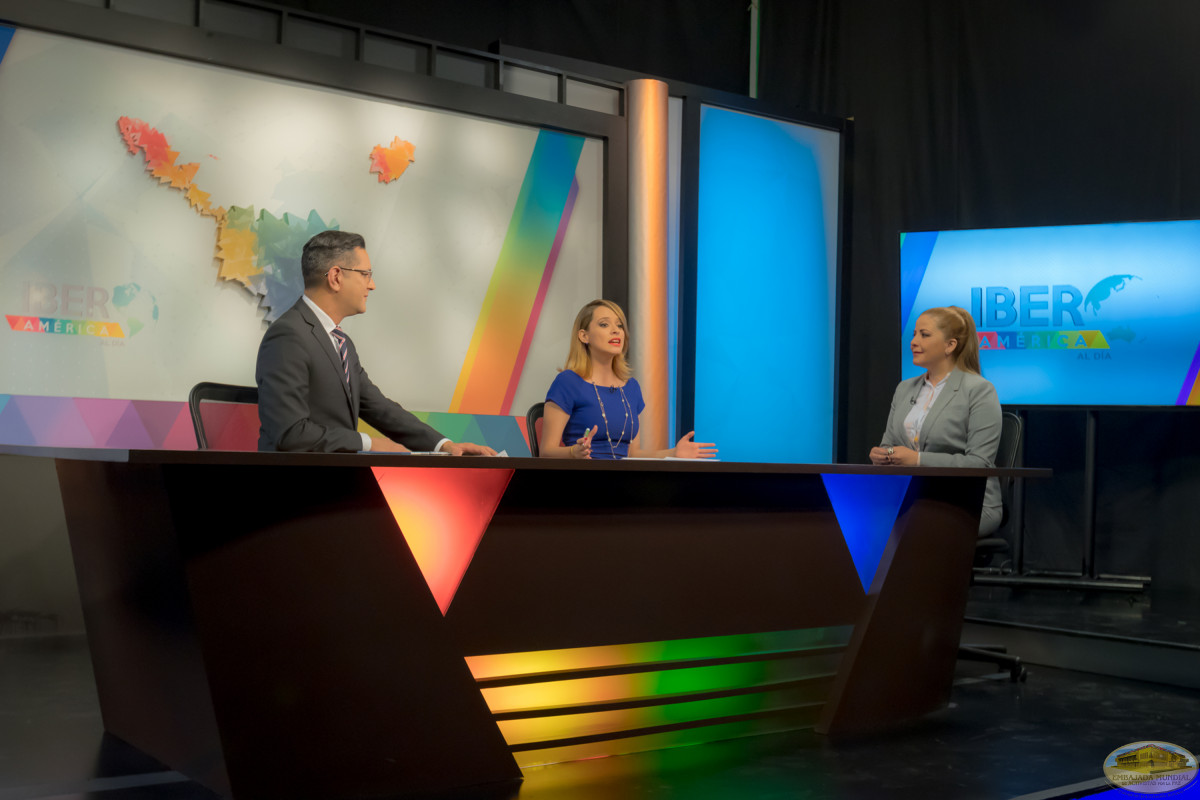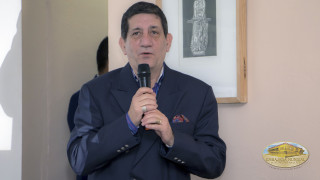ALIUP International Seminar in Mexico
“Part of the solution is to modify educational cultures in where discipline has become independent from ethics, from principles and values,” said Gabriela Lara, director general of the GEAP.
The following met in order to propose new approaches and strategies that permit the reach for complete human and national development, and the construction for a culture of peace through higher education:
- Academic authorities and professors of Mexico
- Members of the Secretary of Public Education
- The Organization of Ibero-American Studies for Education, Science and Culture
- The Federation of Mexican Institutions of Higher Education
- The National Association of Universities and Institutions of Higher Education
- The Educational Television of Mexico
- The Global Embassy of Activists for Peace (GEAP)
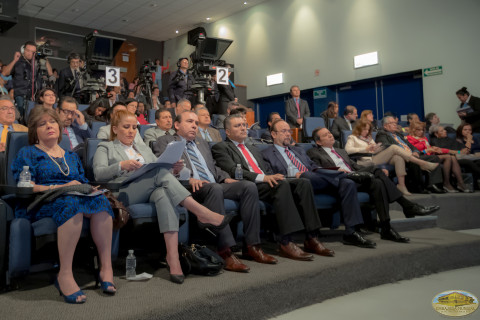
This event, designated as the International Seminar “Challenges of Higher Education in Human Development and Society” of the International Alliance of Universities for Peace (ALIUP) was coordinated by the GEAP with Educational Television, in Mexico City.
The central emphasis of the seminar was to reorient a higher education for an integral formation, reason why one of the principal proposals is the creation and development of the Chair for Peace and Universal Values as main subjects in the formation programs in high education institutes.
Likewise, to promote between the institutions and professors of high education a network of academic, scientific and cultural exchange, that develop projects and campaigns that focus on the promotion of peace, an education for the sustainable development and the happiness of the human family.
The ALIUP is integrated by more than 170 universities from different countries; 120 institutions in Mexico have joined the network.
New emphasis of education
Gustavo Lomelin Cornejo, general director of the Educational Television, expressed in words of welcome that:
“From a democratic vision, we consider that the new emphasis in the ways of being and doing in education are our nation’s project”
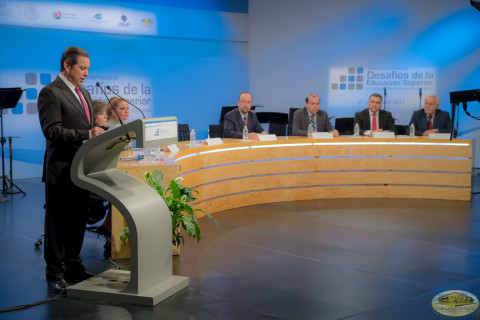
Furthermore, he explained that Educational Television is in solidarity with actions that seek the educational strengthening in all its aspects, in where the wellness of the community, the respect for human beings and ethnic, social, cultural or religious differences converge.
Francisco Guerra, national coordinator of the GEAP in Mexico, pointed that the Institution works for “the establishment of an education based in principles and values that promote peace and full development of the human being in the towns, nations and in between nations.”
For this purpose, he detailed that the EMAP promotes the creation and development of educational programs that foment the pacific solution of conflicts, the respect for human rights and Mother Earth, within teaching, research and extension of higher education.
Graduates with a structure of values, committed to their environment
In his participation, the undersecretary of Higher Education and coordinator of Strategic Linkage, David Xicoténcatl Rueda López, pointed out that one of the concerns of the productive sector is that they preferred graduates with soft skills rather than basic knowledge.
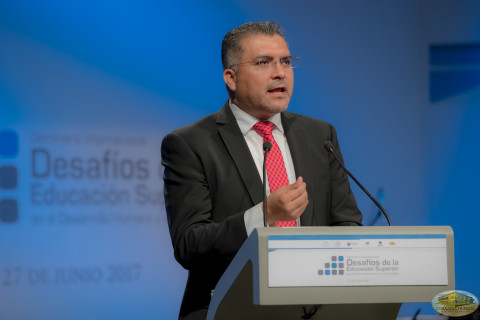
He expressed that:
“We have put the priority in dual training and alternation in higher education; The dual formation seeing it not as a scheme of needs exclusively of the productive sector, but of having a more integral formation of our students”
Arturo Velázquez Jiménez, director and representative in Mexico of the Organization of Ibero-American Studies for Education, Science and Culture, in his presentation he highlighted the importance of the interaction of universities with the environment.

“Universities are at the center of a propeller in where the three blades are linked to the public, social and productive sectors. Universities have that interaction, and they must always consider what the needs of that context are, in such a way that one can have this job coordinated with the global environment,” he specified.
Velázqez emphasized that universities can promote training a new technical professional, a public servant with a structure of values, which can contribute to the development of the community.
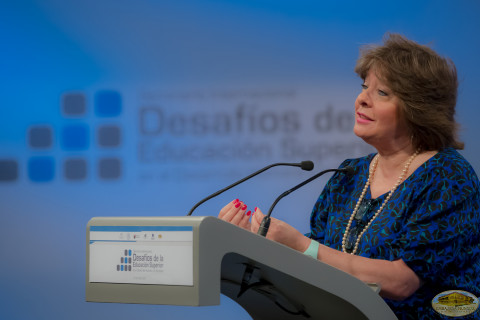 Dr. Sonia Bacha, FIMPES Accrediation Dir. Spoke of accreditation and the work in favour of the formation in values in higher education.
Principles of quality and development skills
Dr. Sonia Bacha, FIMPES Accrediation Dir. Spoke of accreditation and the work in favour of the formation in values in higher education.
Principles of quality and development skills

Sonia Bacha Baz, director of Administration of the Accreditation System of the Federation of Mexican Institutions of Higher Education, indicated that the Federation has been working in a structural formation of values and the development of principles of quality that has to do with what the educational institute sees in its environment and realizes what it needs.
She highlighted that the students must know which are the needs of their surroundings, “not only in a university level, but also in terms of social justice and what another needs to have for them to have a better space.”
In an additional point, she signaled the importance of students that learn to learn, “that leave with a motivation to continue learning, because they will need to solve problems that do not yet exist, with tools and the technology that have not been invented either,” she assured.
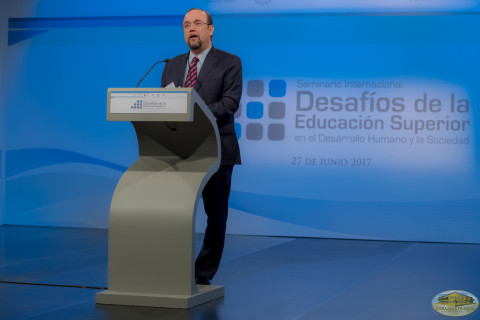
Other factors, the extension of the coverage with equity and the continuous improvement of quality; the development of abilities in students such as working as a team, resolving conflicts and adapting to change. Likewise, the full exercise of social responsibility, legal and budgetary certainty for the development of higher education.
New paradigms in higher education for peace
Gabriela Lara, general director of the GEAP, read the educational proposal of the executive president of the GEAP, William Soto Santiago, which exhibits:
“Many educational models focus on regulating educational processes that define the contents to be imparted, the procedures, but do not penetrate into the very essence of teaching. An educational model must first recognize how the individual is formed integrally.”
“Part of the solution is to modify educational culture in which the disciplines have become independent of ethics, principles and values; to establish new paradigms in high education for peace, from the integral formation of the human being in his heart, spirit and body.”
The proposal of Dr. William Soto focuses on a comprehensive education that makes students transformational leaders who transform themselves, are in permanent evolution as leaders, transform those around them and develop other leaders.
Proposals of the work tables
The seminar developed through simultaneous work tables with different topics, each of these having members of academic authorities, professors, teachers and other members of the educational field. Each working group elaborated a document of proposals that was given to the EMAP at the end of the event.
Table 1: Pedagogical focus for the knowledge and practice of universal principles and values in the process of student’s training.
The conclusions were presented by Leticia Martínez Díaz Barriga, doctor in Pedagogy of the AAPAUNAM.
Among the proposals were:
- Educators oriented on universal values with ethic and attitudinal responsibility, for the impulse of these values.
- Technology must be used to inculcate universal values and to generate more educational content.
- To learn how to reconstruct values and return to sports activities that inculcate discipline and respect.
- We must watch over the teacher’s council of the institutions so that their work is attached to the values that we want to teach our youths.
Table 2: An integral education that favors the construction of a culture of peace, the promotion and protection of human rights and the values of democracy.
Ángela Parra Santa Rosa, chief of the Curricular Innovation in High Education, presented these conclusion.
Among the proposals were:
- For a comprehensive education that promotes peace and rights within a framework of democracy and care of the planet, it requires a vision of the gender perspective and the recognition of age, ethnicity, sexual and all kinds of diversity.
- To generate educational models reasoned in 4 aspects: Philosophical, epistemological, psycho-pedagogical and didactical.
- To have strategies or lines of action based in principles and values.
- To make a diagnostic to detect problems and search for solutions of peace.
Table 3: The inclusion of the Chair for Peace in the University System
The conclusions were read by Tamara Kolangui, director of the Chair Shimon Peres for Peace, Anáhuac University.
Among the proposals were:
- There must be activities that orientate to peace as the family environment in the Chair for Peace.
- All issues that treat with peace be included in all subjects, so that values such as responsibility, commitment and mutual respect are taken into consideration.
- Include and consider “the culture of peace and human rights” as part of the curriculum, seeking to be evaluated as a necessary competence for the future professional, which is in the evaluation rubrics of the designated integral and social service projects.
- Include the formation of the youths as “promotors of peace.”
Table 4: The social responsibility of universities and institutes of high education in the process of creating a culture of peace in society.
Alma Alvarado Pérez, secretary of Attendance to Foreign Academic Staff of the AAPAUNAM presented the proposals of the work table.
Among the proposals were:
- Promote a social conscience through education, human rights and equity.
- Make a redefinition of comprehensive training.
- Promote cases of success among the internal and external actors of education, their relevance in the process of student training, with the aim of raising awareness and achieving a more active participation.
- Redefine higher education whilst considering the social responsibility and involvement of students, academics and administrators, as well as officials from each unit.
